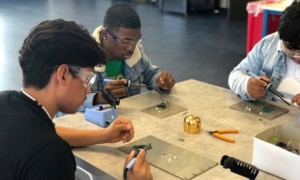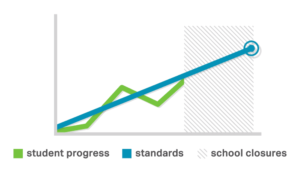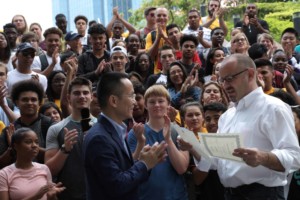Smart Cities Q&A with Jessie Woolley-Wilson

DreamBox Learning is a leading adaptive learning system for elementary math. CEO Jessie Woolley-Wilson, a former Blackboard executive, also serves as director of the International Association for K-12 Online Learning.
TVA: There’s lots of talk about mindset these days; what’s your take?
JWW: Student success is the ultimate goal, both in school and in life. We want to prepare students for the future and encourage them to become innovators on a local and global scale. We need to help them develop a nimble intelligence so that they can demonstrate critical thinking, mentally adapt, and, ultimately, thrive in diverse jobs and industries — even those that do not yet exist today. Education is a process through which we not only build students’ confidence in themselves, but also feed their curiosity about the world around them and their role in it.
TVA: What role does feedback play?
JWW: The key to innovative education is to encourage critical thinking and collaborative problem solving so that students can harness collective wisdom and repeatedly evolve their capabilities. Increasingly, students have to “learn how to learn” in order to keep pace with an ever-changing workforce and world. When the learning environment is highly adaptive and personalized, students are best able to optimally (and enthusiastically) learn. At DreamBox, our pioneering Intelligent adaptive learning technology provides customized feedback to both learners and learning guardians to create a highly effective, dynamically adaptive learning environment that more effectively engages students in their own development and success.
TVA: Does that produce a sense of agency?
JWW: What we have seen is that when students feel that their education is tailored to their needs and abilities, it engenders a sense of independence and self-confidence that will help propel them forward into higher education and beyond.
TVA: So confidence matters?
JWW: Every child deserves an educational experience that is engaging, personalized, and, above all, effective. Through our pioneering intelligent adaptive learning technology, we encourage students to learn by doing and to think critically in the way that best fits their needs and abilities. This encouragement and success builds confidence and fosters a lifelong commitment to learning that they’ll need to leverage future opportunities.
TVA: What do next gen environments look like?
JWW: To drive lifelong learning and the success of students early on, we must partner with educators to foster an environment where students learn at their own pace in an encouraging environment that cultivates a deep conceptual understanding of the subject matter. When students develop a deep understanding of concepts, they can apply and transfer that learning to new situations and experience success again and again. We must dynamically meet student needs and engage them in a personalized manner to build the confidence that will enable them to become future innovators in their homes and abroad.
TVA: What have you learned about tech integration?
JWW: Technology is not a panacea and should not be pursued in isolation of high quality curriculum and high quality teaching. The best learning environments are those where technology is seamlessly integrated into learning while supporting student success. It’s vital for future learning environments to be highly engaging, provide personalized learning pathways, and offer individualized student data that helps learning guardians understand what approach is working with what student and why. The opportunity to have continuously and dynamically adapting learning experiences that change based on what a student can demonstrate in terms of deep understanding, while encouraged to persist through challenge, is at the heart of Intelligent Adaptive Learning that serves both leaders and learning guardians.
DreamBox Learning is a Getting Smart advocacy partner.





0 Comments
Leave a Comment
Your email address will not be published. All fields are required.